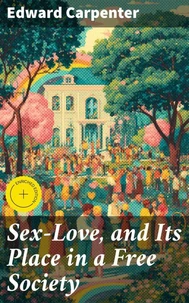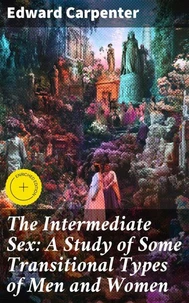Marriage in Free Society. Challenging Traditional Views on Marriage and Society
Par :Formats :
Disponible dans votre compte client Decitre ou Furet du Nord dès validation de votre commande. Le format ePub est :
- Compatible avec une lecture sur My Vivlio (smartphone, tablette, ordinateur)
- Compatible avec une lecture sur liseuses Vivlio
- Pour les liseuses autres que Vivlio, vous devez utiliser le logiciel Adobe Digital Edition. Non compatible avec la lecture sur les liseuses Kindle, Remarkable et Sony
 , qui est-ce ?
, qui est-ce ?Notre partenaire de plateforme de lecture numérique où vous retrouverez l'ensemble de vos ebooks gratuitement
Pour en savoir plus sur nos ebooks, consultez notre aide en ligne ici
- Nombre de pages121
- FormatePub
- ISBN406-4-06-614060-1
- EAN4064066140601
- Date de parution20/12/2019
- Protection num.Digital Watermarking
- Taille548 Ko
- Infos supplémentairesepub
- ÉditeurGOOD PRESS
Résumé
In 'Marriage in Free Society' by Edward Carpenter, the author explores the concept of marriage in a society where freedom and individualism are valued above all else. Through a series of essays, Carpenter challenges traditional views on marriage and advocates for a more open and equitable approach to relationships. His writing style is both thought-provoking and insightful, prompting readers to question societal norms and consider alternative ways of living.
Written in the late 19th century, Carpenter's work is a product of the progressive and avant-garde intellectual climate of the time, making it a significant contribution to the discourse on relationships and social structures. The book's content reflects Carpenter's deep understanding of human nature and his belief in the potential for a more enlightened and liberated society. 'Marriage in Free Society' is recommended for readers interested in exploring unconventional ideas about relationships and societal norms, as well as those interested in the history of progressive thought.
Written in the late 19th century, Carpenter's work is a product of the progressive and avant-garde intellectual climate of the time, making it a significant contribution to the discourse on relationships and social structures. The book's content reflects Carpenter's deep understanding of human nature and his belief in the potential for a more enlightened and liberated society. 'Marriage in Free Society' is recommended for readers interested in exploring unconventional ideas about relationships and societal norms, as well as those interested in the history of progressive thought.
In 'Marriage in Free Society' by Edward Carpenter, the author explores the concept of marriage in a society where freedom and individualism are valued above all else. Through a series of essays, Carpenter challenges traditional views on marriage and advocates for a more open and equitable approach to relationships. His writing style is both thought-provoking and insightful, prompting readers to question societal norms and consider alternative ways of living.
Written in the late 19th century, Carpenter's work is a product of the progressive and avant-garde intellectual climate of the time, making it a significant contribution to the discourse on relationships and social structures. The book's content reflects Carpenter's deep understanding of human nature and his belief in the potential for a more enlightened and liberated society. 'Marriage in Free Society' is recommended for readers interested in exploring unconventional ideas about relationships and societal norms, as well as those interested in the history of progressive thought.
Written in the late 19th century, Carpenter's work is a product of the progressive and avant-garde intellectual climate of the time, making it a significant contribution to the discourse on relationships and social structures. The book's content reflects Carpenter's deep understanding of human nature and his belief in the potential for a more enlightened and liberated society. 'Marriage in Free Society' is recommended for readers interested in exploring unconventional ideas about relationships and societal norms, as well as those interested in the history of progressive thought.




